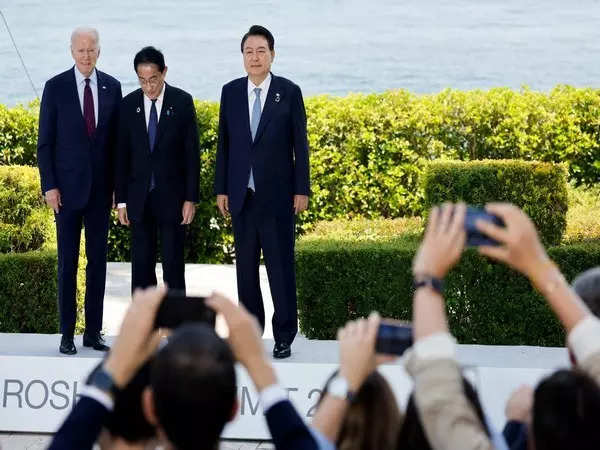HIROSHIMA: United States President Joe Biden on Sunday invited Japanese Prime Minister Fumio Kishida and South Korean President Yoon Suk Yeol to hold a formal trilateral meeting, Kyodo News Agency reported.
The invitation comes amid Chinese assertiveness in the Indo-Pacific region. Moreover, the G7 leaders during the Summit in Hiroshima agreed on the importance of the G7 having a unified approach on China, recognising the systemic challenge China poses to our collective economic security and regional stability.
Biden commended Kishida and Yoon on their courageous work to improve their bilateral ties when he met with them together in Hiroshima on the sidelines of the Group of Seven summits, according to the statement released by the White House.
The leaders discussed how to take their trilateral cooperation to new heights, including new coordination in the face of North Korea’s illicit nuclear and missile threats, on economic security, and on their respective Indo-Pacific Strategies.
The leaders last held a three-way meeting in Cambodia in November and agreed to share missile warning data in real-time to cope with the growing threat of North Korea’s nuclear and missile program.
In the previous year’s meeting, all three leaders reaffirmed the trilateral partnership guided by shared values, driven by innovation, and committed to shared prosperity and security. The Leaders commended the unprecedented level of trilateral coordination. Together, in their second trilateral meeting this year, the Leaders resolved to forge still closer trilateral links, in the security realm and beyond.
“They recognize that the Indo-Pacific cannot be stable and secure while aggression rages anywhere; threats to territorial integrity and sovereignty undermine the fabric of the entire international order. They share condemnation in the strongest possible terms of Russia’s indiscriminate attacks against civilians and civilian infrastructure and call for the immediate restoration of Ukraine’s territorial integrity and sovereignty,” the statement read.
“They condemn Russia’s nuclear threats to coerce and intimidate and state unequivocally that any use of a nuclear weapon by Russia would be an act of hostility against humanity and Russia shall never use it under any circumstances,” it added.
The leaders strongly opposed any unilateral attempts to change the status quo in the waters of the Indo-Pacific, including through unlawful maritime claims, militarization of reclaimed features, and coercive activities.
The leaders reiterated their firm commitment to the rule of law, including the freedom of navigation and overflight, consistent with the UN Convention on the Law of the Sea (UNCLOS).
The invitation comes amid Chinese assertiveness in the Indo-Pacific region. Moreover, the G7 leaders during the Summit in Hiroshima agreed on the importance of the G7 having a unified approach on China, recognising the systemic challenge China poses to our collective economic security and regional stability.
Biden commended Kishida and Yoon on their courageous work to improve their bilateral ties when he met with them together in Hiroshima on the sidelines of the Group of Seven summits, according to the statement released by the White House.
The leaders discussed how to take their trilateral cooperation to new heights, including new coordination in the face of North Korea’s illicit nuclear and missile threats, on economic security, and on their respective Indo-Pacific Strategies.
The leaders last held a three-way meeting in Cambodia in November and agreed to share missile warning data in real-time to cope with the growing threat of North Korea’s nuclear and missile program.
In the previous year’s meeting, all three leaders reaffirmed the trilateral partnership guided by shared values, driven by innovation, and committed to shared prosperity and security. The Leaders commended the unprecedented level of trilateral coordination. Together, in their second trilateral meeting this year, the Leaders resolved to forge still closer trilateral links, in the security realm and beyond.
“They recognize that the Indo-Pacific cannot be stable and secure while aggression rages anywhere; threats to territorial integrity and sovereignty undermine the fabric of the entire international order. They share condemnation in the strongest possible terms of Russia’s indiscriminate attacks against civilians and civilian infrastructure and call for the immediate restoration of Ukraine’s territorial integrity and sovereignty,” the statement read.
“They condemn Russia’s nuclear threats to coerce and intimidate and state unequivocally that any use of a nuclear weapon by Russia would be an act of hostility against humanity and Russia shall never use it under any circumstances,” it added.
The leaders strongly opposed any unilateral attempts to change the status quo in the waters of the Indo-Pacific, including through unlawful maritime claims, militarization of reclaimed features, and coercive activities.
The leaders reiterated their firm commitment to the rule of law, including the freedom of navigation and overflight, consistent with the UN Convention on the Law of the Sea (UNCLOS).
